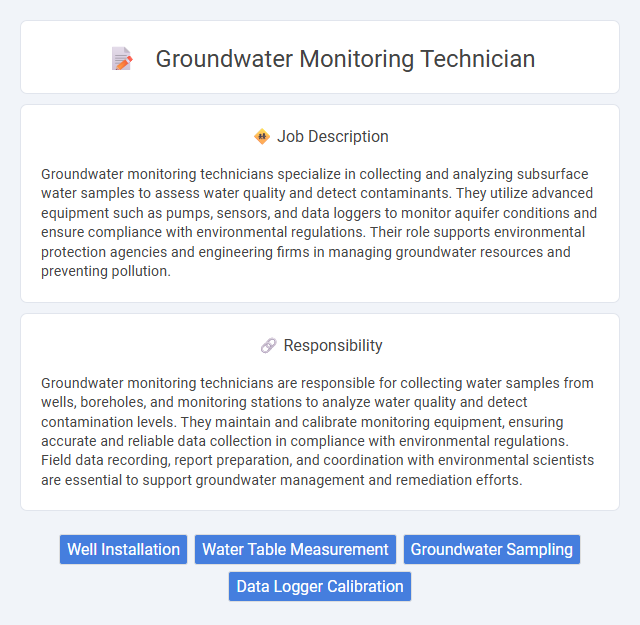
Groundwater monitoring technicians specialize in collecting and analyzing subsurface water samples to assess water quality and detect contaminants. They utilize advanced equipment such as pumps, sensors, and data loggers to monitor aquifer conditions and ensure compliance with environmental regulations. Their role supports environmental protection agencies and engineering firms in managing groundwater resources and preventing pollution.
People who enjoy working outdoors and are comfortable with repetitive tasks might find a groundwater monitoring technician role suitable. Those with good attention to detail and a basic understanding of environmental science may have a higher probability of success in this job. Individuals who prefer a stable routine and can handle physical labor are likely to adapt well to the demands of groundwater monitoring.
Qualification
Groundwater monitoring technicians typically require a minimum of a high school diploma or GED, with many employers preferring candidates who have completed coursework in environmental science, geology, or hydrology. Certification such as HAZWOPER (Hazardous Waste Operations and Emergency Response) and experience in using monitoring equipment, data logging, and sampling techniques are highly valued. Strong analytical skills, attention to detail, and familiarity with environmental regulations like EPA standards are essential for accurately collecting and reporting groundwater data.
Responsibility
Groundwater monitoring technicians are responsible for collecting water samples from wells, boreholes, and monitoring stations to analyze water quality and detect contamination levels. They maintain and calibrate monitoring equipment, ensuring accurate and reliable data collection in compliance with environmental regulations. Field data recording, report preparation, and coordination with environmental scientists are essential to support groundwater management and remediation efforts.
Benefit
Groundwater monitoring technician positions likely offer benefits such as competitive salaries and opportunities for fieldwork in diverse environmental settings. Health insurance, retirement plans, and paid training may be included, supporting long-term career growth. Job stability could be probable due to increasing environmental regulations and water resource management needs.
Challenge
Groundwater monitoring technicians likely face challenges in accurately collecting and analyzing data under variable environmental conditions, which may impact the reliability of groundwater quality assessments. Complex contamination sources and fluctuating water table levels could require constant adaptation and problem-solving skills to ensure precise monitoring. The probability of encountering technical difficulties with equipment or data interpretation adds to the demanding nature of this role.
Career Advancement
Groundwater monitoring technicians gain valuable expertise in hydrology, environmental regulations, and data analysis, creating a strong foundation for career advancement. With experience, they can progress to roles such as environmental scientist, hydrogeologist, or project manager, often requiring certifications like OSHA or state-specific licenses. Mastery of groundwater contamination assessment and remediation strategies enhances opportunities for supervisory or consulting positions in environmental services.
Key Terms
Well Installation
Groundwater monitoring technicians specializing in well installation perform precise drilling, casing, and development of monitoring wells to ensure accurate groundwater data collection. They utilize advanced equipment and adhere to environmental regulations to establish wells that provide reliable samples for contamination assessment and water quality analysis. Their expertise supports effective groundwater resource management and environmental protection initiatives.
Water Table Measurement
A groundwater monitoring technician specializes in accurately measuring water table levels using tools like piezometers and observation wells, ensuring data integrity for hydrological studies and environmental assessments. Proficiency in GPS mapping and data logger calibration enhances the technician's ability to track fluctuations in aquifer levels over time. This role is critical for managing water resources, detecting contamination, and supporting sustainable groundwater extraction practices.
Groundwater Sampling
Groundwater monitoring technicians specialize in collecting groundwater samples to assess water quality and detect contamination levels. They utilize specialized equipment such as submersible pumps and bailers to extract precise water samples from monitoring wells following established environmental protocols. Accurate groundwater sampling is crucial for regulatory compliance, environmental impact assessments, and ensuring safe groundwater resources.
Data Logger Calibration
A Groundwater Monitoring Technician specializing in data logger calibration ensures precise measurement and recording of groundwater parameters such as water levels, temperature, and quality. They perform routine calibration and maintenance of data loggers to maintain accuracy and reliability in environmental monitoring systems. Expertise in troubleshooting electronic sensors and interpreting calibration data is essential for regulatory compliance and effective groundwater resource management.
 kuljobs.com
kuljobs.com